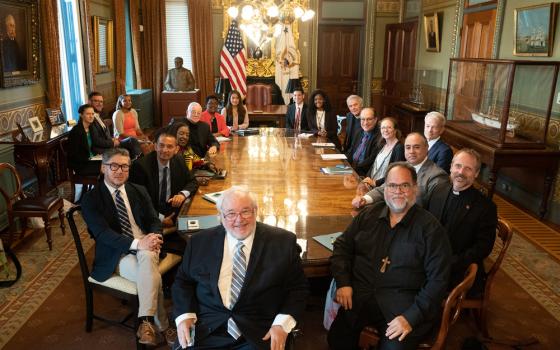The 19th Wife
David Ebershoff
New York: Random House, 2008 and 2009
Instances of polygamy popping up occasionally in the news indicate that its practice is still to be found in isolated cases. In this novel, the author exposes the practice of "plural wives" that formerly operated wholesale among members of the Latter Day Saints (Mormons).
Although a work of fiction, it is based upon their archival materials in Salt Lake City, as well as stories from the press, and the memoir of Ann Eliza Young (Brigham Young's 19th wife) published in 1874. The historical structure is fleshed out by the author's creative imagination.
Pressured by the tenet that having/being plural wives was the will of God made known through their founder, men and women alike succumbed to this practice. The dynamics of the story reveal how it morphed into poorly disguised exploitation of young females in steady supply for the (fewer) men. Ann Eliza was but one of Brigham Young's likely 51 wives!
Ebershoff presents the historical material as coming from a fictitious graduate student's work on her master's thesis, and adds more fiction with a parasitical crime mystery. These two components engagingly bounce the reader back and forth between past and contemporary time.
Although the practice of polygamy has center stage in this book, the historical contexts tell us much more about the Latter Day Saints. It is puzzling, entertaining and informative.
* * * * * *
 On the Mystery: Discerning Divinity in Process
On the Mystery: Discerning Divinity in Process
Catherine Keller
Minneapolis: Fortress Press, 2008
Many progressive Christians are finding their beliefs, preserved in "once and for all time" theological absolutes, to be anachronistic today. Thus, such persons are stuck between a passive acquiescence to such propositions or dismissal of the entire doctrinal construction.
Keller terms these two attitudes as "absolute" and "dissolute," respectively. She proposes a third option: the "resolute," grounded in process theology. She translates "process" (also the Greek word "genesis") as "becoming," and says that "the way of process is a way of open-ended interactivity." It is, therefore relational -- which is not the same as relative.
Process offers a dynamic key for interpreting the relationship between God and the world of creation. It opens up the deadends of our absolutist theological propositions, the author says. "These unchangeables may prove to be merely theological fixations rather than fixities." They include statements about God.
Keeping in mind Paul's statement: "We speak God's wisdom in mystery" (I Cor, II: 7), Keller takes readers "on the mystery" of seven basic Christian themes. Her theological considerations are stunning insights enriched with scripture, poetry, history, science, mysticism, and spirituality. It's all there and full of surprises. The text itself seems in motion, teeming with potential "moments of truth."
This is one of the most exciting and inspiring treatises I have encountered in many years. A chapter on parables is, by itself, worth the price of the book. It cannot be read in one gulp; only thoughtful study will do it justice.
* * * * * *
 Quest for the Living God: Mapping Frontiers in the Theology of God.
Quest for the Living God: Mapping Frontiers in the Theology of God.
Elizabeth A. Johnson
New York and London: Continuum, 2007
People are discovering God again, Johnson says. They are encountering divine presence and absence in their everyday experiences of struggle and hope, both ordinary and extraordinary. This book offers a guided tour of some peoples and places opening themselves to such experiences.
Frontiers lure settlers into the future. In this book Johnson describes the questing of communities and ethnicities in their now changed and ever-changing futures. (It does not deal with the individual "seeker.")
After some introductory anthropology, she pronounces two truths: 1) "the reality of the living God is an ineffable mystery beyond all telling," and 2) literary tools of analogy, metaphor, and symbol help us say something about God, but "no expression of God can be taken literally. None."
Our first stop is at what may be the most difficult frontier of all: that of the Jews. Next we visit American peoples who relate to a liberating God: Latinos, African-Americans, women. In a chapter on pluralism, we deal theologically and pragmatically with a generic mix of other peoples ("What has God been up to outside our tribe?"). Lastly, Johnson makes a courageous effort to include a role for the Trinity -- divine community.
This book is written with superb organization, great color and clarity. Readers may find in it a source of empathy for these "People of God" and of some help in analyzing their own community's questing.
* * * * * *
Find more Book Club selections here: Books to give at Christmas
[Regina Schulte has a master's degree in theology from the University of Notre Dame and a doctorate in theology from Marquette University. Now retired from her academic (college and seminary) career, she continues her educational endeavors by writing and a variety of other endeavors. Regina's book reviews appear regularly in Corpus Reports.]





